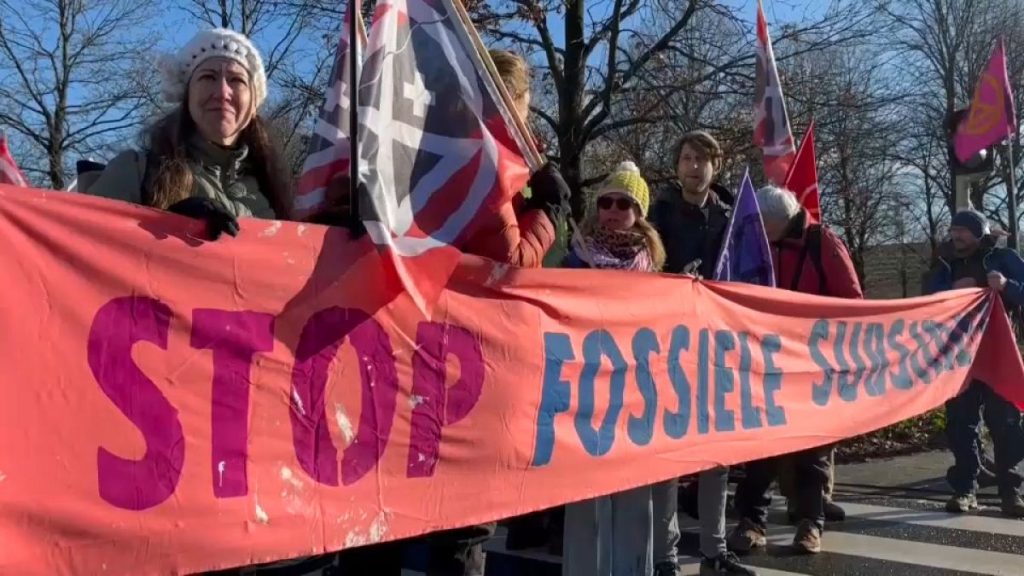The Dutch branch of Extinction Rebellion, a global environmental activist group, staged a disruptive protest on Saturday, blocking a major artery of traffic in and out of The Hague, the Netherlands’ political center. The demonstration targeted the A12 highway, a key route for commuters and commercial vehicles, causing significant disruption to the city’s traffic flow. This action was undertaken in defiance of a preemptive ban issued by authorities, who had erected barriers in anticipation of the protest. Despite these measures, hundreds of activists, operating in smaller, more agile groups, successfully breached the security cordon and occupied the highway, effectively halting vehicular movement. Police responded with a show of force, deploying water cannons to disperse the demonstrators and detaining an undisclosed number of participants.
This particular stretch of the A12 highway has become a recurring battleground between Extinction Rebellion and Dutch authorities. The activist group has repeatedly targeted this location as a symbolic protest against the government’s policies concerning fossil fuel subsidies. The recently elected right-wing government’s decision to reinstate previously abolished subsidies has further fueled the group’s ire and motivated their continued actions. Extinction Rebellion argues that these subsidies perpetuate the use of fossil fuels, exacerbating the climate crisis and undermining efforts to transition to sustainable energy sources. They view the government’s actions as a betrayal of its environmental commitments and a dangerous disregard for the urgent need to address climate change.
The protesters’ motivations are rooted in a deep sense of urgency and frustration with the perceived inaction of governments worldwide in addressing the climate crisis. They see the escalating frequency and intensity of extreme weather events, such as the wildfires raging in Los Angeles, as stark evidence of the accelerating impacts of climate change. These events underscore the need for immediate and drastic action to mitigate the effects of a warming planet. The protesters believe that continuing to subsidize fossil fuels is not only environmentally irresponsible but also economically unsustainable, diverting crucial resources away from investments in renewable energy and other climate-friendly solutions.
The core of Extinction Rebellion’s argument centers on the significant financial outlay by the Dutch government in support of the fossil fuel industry. They cite figures claiming that the government allocates between €39.7 and €46.4 billion annually to these subsidies, representing a substantial investment in industries they deem detrimental to the environment. They contend that this money could be redirected towards sustainable initiatives, fostering a green economy and creating jobs in renewable energy sectors. The activists see these subsidies as a direct contradiction to the government’s stated environmental goals and a blatant prioritization of short-term economic gains over long-term environmental sustainability.
The clash between Extinction Rebellion and the Dutch authorities highlights a growing tension between environmental activism and government policy. The activists’ willingness to engage in disruptive civil disobedience reflects a deep-seated frustration with the perceived inadequacy of conventional political processes to address the climate crisis. They argue that drastic action is necessary to force governments to confront the urgency of the situation and implement meaningful change. The government, on the other hand, faces the challenge of balancing the right to protest with the need to maintain public order and ensure the smooth functioning of society.
This incident is not an isolated event but rather part of a broader global movement of climate activism. Extinction Rebellion, with its distinctive non-violent direct action tactics, has gained prominence for its willingness to disrupt the status quo and challenge established power structures. The group’s actions, while often controversial, have brought increased attention to the issue of climate change and sparked public debate about the effectiveness of government policies and the role of civil disobedience in driving social and political change. The ongoing conflict between Extinction Rebellion and the Dutch government represents a microcosm of the larger struggle between environmental activists and governments worldwide, a struggle that is likely to intensify as the impacts of climate change become increasingly evident.














